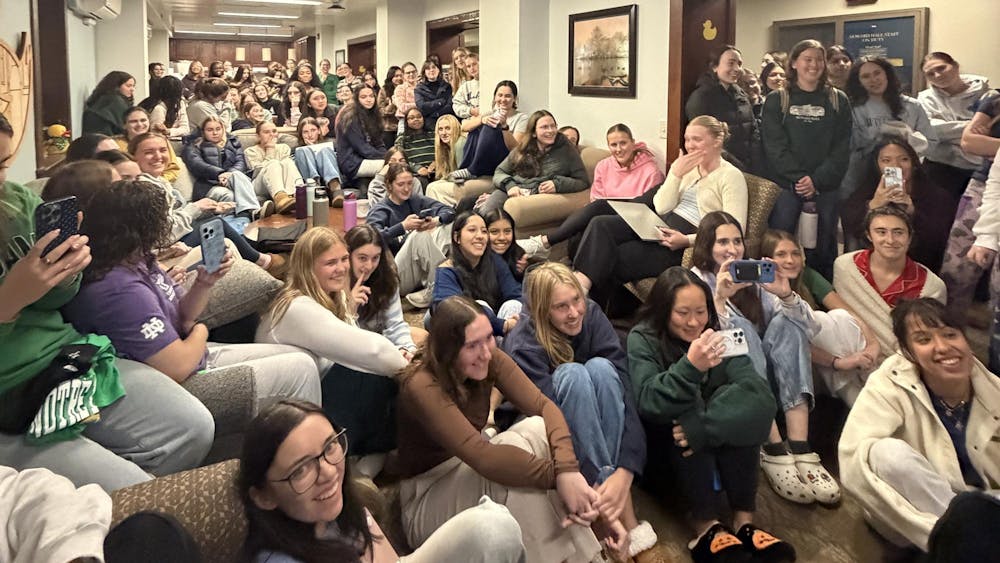The Notre Dame student senate convened Wednesday evening in Jordan Hall, discussing resolutions concerning mini-break classwork, adaptations to the Moreau course, integration of Notre Dame ID cards into smartphone wallet applications and additional support for Zahm House residents during the hall transition process.
Before launching into conversations about the meeting’s resolutions, student body vice president senior Sarah Galbenski gave an update on the Student Advisory Group. Galbenski said the group focused on four main topics: vaccination, commencement, the Zahm community and the housing policy.
Before vaccinating students, Notre Dame is still waiting for state approval and proper supply of the Johnson & Johnson vaccine, Galbenski said. She also said that the Student Advisory Group is hopeful for an in-person commencement with plans to announce the finalized policy by the end of the month.
On the topic of Zahm, Galbenski said the Division of Student Affairs is personally responding to every student-voiced concern. Zahm first-years have also been given personalized attention and extra time to select a residence hall preference, she said. Finally, Galbenski said the housing policy, previously adjusted to allow more students to move off-campus, will be reinstated as normal next semester provided COVID-19 cases decline.
The first resolution, presented by sophomore Flaherty Hall senator Margaret Allen and sophomore Dunne Hall senator Michael Murakami, requested a formal statement to be sent to all University teaching staff regarding mini-break classwork.
Allen said she decided to pursue this resolution after hearing several women in her residence hall discussing the homework assignments, exams, quizzes and other assignments that prevented them from taking a break from schoolwork.
The resolution also asked for the student body to be made aware of the formal statement to better understand the expectations of the mini-breaks.
After the resolution passed, Galbenski said, “I think this will be very productive, and will hopefully make April 21 a more relaxing and rejuvenating day for all.”
Next, senior Kaya Lawrence, director of diversity and inclusion, presented her resolution encouraging the adaptation of the Moreau First-Year Experience to better tell the story of Notre Dame’s history by including Native voices.
Junior Jules Downing, a member of the Moreau Student Advisory Council, spoke in support of the resolution.
“This is the only graded course that reaches every student,” Downing said. “We’re trying to harness the power of that course to tell a very honest history of our campus.”
The resolution was passed, and the senate moved forward with the next resolution from sophomore director of campus technology and innovation Mike Prieto requesting the integration of Notre Dame ID cards into smartphone wallet applications.
The resolution would encourage the University to allow students the option of contactless student ID cards, made possible by smartphone apps such as Apple Wallet and Google Play, while continuing to provide physical IDs to students who prefer that method.
According to the formal resolution, “The option for digital student IDs has been called a ‘game changer’ at universities where it is in place and would help the quality of life for students of Notre Dame.”
The resolution passed, allowing sophomore Zahm House senator Henry Bates to present his resolution concerning the disbandment of Zahm House.
The resolution called on the senate to condemn the violation of public due process and lack of dialogue in the Zahm community and urge the Office of Residential Life to take steps to ease the transition for Zahm residents.
These policies include increasing the number of students who can move as a group, providing mental health resources for Zahm residents and facilitating financial support for some juniors who face challenges pursuing resident assistant positions in new residence halls.
Bates said that the resolution is not intended to reverse the University’s decision, but rather to offer more support for displaced Zahm residents and call for more transparent dialogue with the Zahm community.
“This resolution is not aimed at reversing the University’s decision to disband. I don’t think that is within our grasp,” Bates said. “What it does do is goes against the idea that the University can simply strike down a community, act swiftly on a residence hall with no dialogue with that community and no transparency in the process.”
Sophomore Keough Hall senator Benjamin Erhardt, one of Bates’ resolution partners, also voiced his support for the resolution.
“Whatever your perception is of the Zahm as a whole community, there are individuals in that hall who are really hurting right now, with no say in this decision, and who are going to be hurting for the rest of the semester and admittedly the rest of their Notre Dame experience,” Erhardt said.
In addition to passing this final resolution on Zahm House, the senate approved two orders — one to reappoint senators to serve the remainder of the 2020-2021 academic term and another to suspend class council and hall elections in residence halls with only one candidate up for election.
Senate passes resolutions on Zahm House, mini-breaks, Moreau course
Courtesy of Maggie Eastland
Some joined the senate via Zoom, and others participated in person in Jordan Hall 105.









